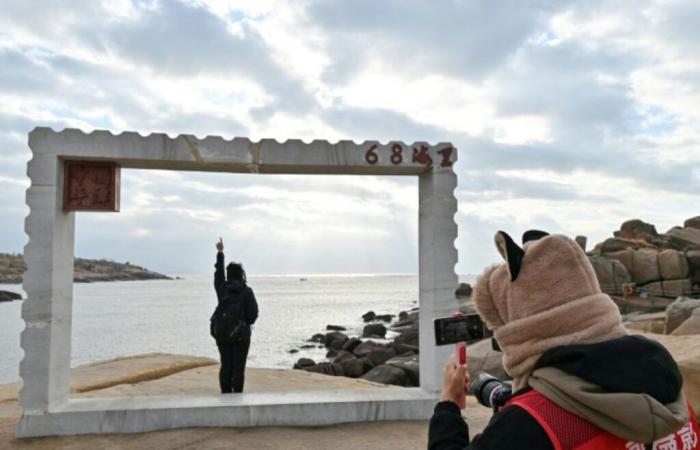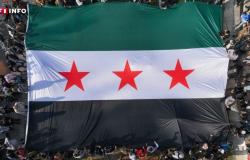On a rock slab overlooking the sea, clusters of Chinese tourists take photos and point their binoculars in the direction of the island of Taiwan, more than a hundred kilometers from the coast.
Taipei accuses Beijing of launching its biggest maritime maneuvers in years this week, deploying nearly 60 warships and 30 patrol boats between Japan’s southern islands and the South China Sea.
Unlike the last large-scale military maneuvers, China has remained silent on these exercises.
On the picturesque island of Pingtan, the closest Chinese territory to the main island of Taiwan, visitors seem more interested in their selfies than in the ongoing military maneuvers.
“Reunification soon!”, the tourists shout in unison, posing in front of the lens.
“We hope for rapid unification, but it depends on the will of the people on both sides of the strait,” a tourist surnamed Hu, from the eastern province of Jiangsu, told AFP.
“There is only one China,” he adds.
Since the flight of Chinese nationalists in 1949 to the former Japanese colony, Beijing has maintained that Taiwan is part of its territory and has not ruled out using force to take control of it.
More than 90% of Taiwanese say they are opposed to Chinese annexation, and the majority of the population considers themselves to be “first and foremost Taiwanese”, according to regular polls.
– “Why fight?” –
Another Chinese tourist visiting Pingtan, Mr. Zhang, aged 70, believes that forced unification would be quick, but that “the damage for the populations on both sides of the strait would be too high”.
“We are all Chinese, so why fight?” adds Mr. Zhang, who comes from Zhejiang province, near Shanghai. “It would be better if everyone united peacefully.”
“We do not fear war, but we prefer to avoid it,” he adds.
Near the coast, propaganda posters on the walls of a military compound encourage passersby to “follow the Party’s orders” and “be able to win battles.”
The bellicose rhetoric, however, contrasts with the quiet atmosphere of the island, where the calm of the streets lined with washing lines is only interrupted by rare passages of scooters.
Nian Mei-sheng, a 74-year-old retiree, says he often saw military planes during maneuvers, particularly after the inauguration in May of Taiwanese President Lai Ching-te, whom Beijing describes as a “separatist.”
“When we worked in the mountains, we often saw planes passing overhead,” the old man told AFP in front of his house.
The Pingtan native notes that the number of Taiwanese tourists visiting the island has declined in recent times.
“Since Lai Ching-te came to power, travel between Taiwan and here has decreased, in both directions,” he says. “We hope that Taiwan will reunite with the mainland… that is our wish.”






